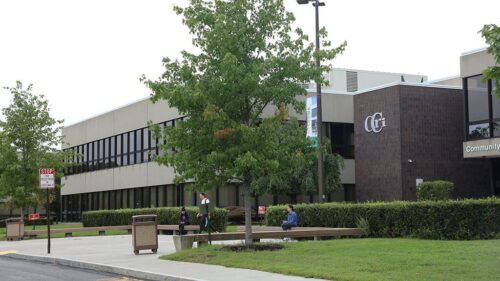Nicole Amaturo’s childhood was full of thumping dance music. The nonbinary high school senior grew up with a mom who is a DJ and event planner, and this spring they decided to follow in their mom’s footsteps by organizing a Pawtucket prom called Queer Youth Boogie Night.
Amaturo began advertising the event on social media. But their eagerness came to a halt in March when they received a death threat in an Instagram direct message after posting about the prom. The message referred to Amaturo using slurs and the person wrote, “I know your IP address,” Amaturo, 19, said in an interview.
“I don’t know why people are just so hateful,” said Amaturo, who will study culinary arts and hospitality next year at Providence’s Johnson & Wales University.
Queer proms have for years offered students an alternative to traditional proms, which can be loaded with unspoken expectations about gender roles and attire. But now, as President Trump rails against DEI and targets transgender rights, queer proms have become spaces where young people can celebrate their LGBTQ identities and bolster their spirits against so-called anti-woke legislation aimed at some schools across the country.
Erin Clark/Globe Staff
Amaturo’s Pawtucket dance on May 23 was one of about a dozen queer proms organized by high school students across New England this spring.
At Hingham High School, a dance Saturday night was dubbed a “Kick-off to Pride,” and balloons bounced between students on a dark dance floor. Katy Perry’s “I Kissed A Girl” rang through speakers as attendees ate pizza and Jersey Mike’s sandwiches. Parents and teachers chaperoning offered flyers connecting kids to local LGBTQ mental health services.
Hingham senior Hope Huffman, who has planned the school’s queer prom for three years, said this year’s dance was more than a celebration. It was a respite.
“Planning queer prom is an escape because it’s a way to think about current queer culture in a positive light, it’s a way to get away from the negativity,” said Huffman, 17.
‘Standing out’
The weight of stereotypical norms at most proms can feel crushing to LGBTQ youth, Huffman said, causing some to try to blend in with straight peers or skip the events altogether.
The rise in anti-LGBTQ rhetoric from some conservative lawmakers and media figures has made young people even more sensitive to scrutiny from peers, they said.
“It’s more difficult for people to act and dress how they want, when they’re unsure if people in that big space will be accepting,” Huffman said.
Because formal attire comes with heavy expectations tied to gender, traditional high school proms place pressure on queer and transgender youth to conform to cis- and heteronormativity, said Robyn Freedner-Maguire with Outright Vermont, an LGBTQ youth group.
“There’s this general sense of, ‘This is how you’re supposed to show up,’” said Freedner-Maguire, whose group’s “Cosmic Jubilee” prom in April had more than 100 attendees.
Huffman, who had fun at their school’s regular prom in a sparkly dress, said they wouldn’t have felt comfortable wearing a suit there, because it would have made them stick out.
“That would be unexpected in a regular prom and make that person stand out, which can then draw negative attention,” Huffman said.
In Framingham, queer youth with the group OUT MetroWest said they’ve disliked prom traditions honoring one king and one queen.
“Gendered prom court is stupid — they could just be crowned as royalty,” said Lily Pearl, the OUT MetroWest’s program and education manager.
Prom season can be ‘complicated’
After Amaturo received the hateful Instagram message, they told their parents and teachers, blocked the account that sent the DM, and set their own account to private.
Amaturo said the message didn’t affect them much, since it was online. But at Amaturo’s regular high school prom in Providence last year, some students gave them and their girlfriend “dirty looks” on the dance floor. Other LGBTQ students wore extravagant dark lace gowns tied to the prom’s Victorian-era theme, Amaturo said. The students were met with laughs, smirks, and “judging,” Amaturo said.
“Every time of year, this is the issue. It’s supposed to be this celebratory time and it’s just complicated for queer and trans youth,” said Freedner-Maguire.
The subtle bullying Amaturo observed last year was what inspired them to create a queer prom, which became their internship capstone project with Youth Pride Inc., a social services nonprofit in Providence.
About 20 high school students attended the May 23 dance at a trendy art gallery in Pawtucket, where a DJ played ’80s “oldies,” new age, and rap, Amaturo said.
“Queer people deserve to be comfortable and not feel scared to dance with their partner just because people are really ignorant,” Amaturo said.
Queer youth ask about Trump news
Even in deep blue Massachusetts, queer high schoolers can feel overwhelmed by the nationwide push to restrict the rights of LGBTQ youth that began in 2021 with state bills targeting transgender athletes and gender-affirming health care for minors, said Zach Bagan, a Spanish teacher at Hingham High who sponsors its Gay Straight Alliance club and organizes the annual queer prom.
Over the years, students like Huffman have come to GSA meetings with questions about current events, like whether the Supreme Court could be open to revisiting its landmark 2015 ruling that gay Americans have a constitutional right to marriage, Bagan said.
Across the US, LGBTQ young people experience higher rates of anxiety and depression than their straight and cisgender peers due to anti-LGBTQ stigma, according to the Trevor Project, an antisuicide nonprofit.
In Massachusetts last year, 20 percent of LGBTQ youth surveyed by the nonprofit reported they were physically threatened or harmed based on their sexual orientation or gender identity in the past year. More than 50 percent said they were discriminated against based on their sexual orientation or gender identity, the group said.
Bagan said he knows some students avoid reading the news because it can be “incredibly depressing.” So at GSA meetings, Bagan gives members “the rundown of what is objectively happening,” and lets students express their feelings and learn from each other.
As seniors prepared for college or travel in other states and abroad, some navigated gut-wrenching choices about their gender marker on IDs, which became more fraught after the State Department in January began issuing passports with gender markers for people’s sex assigned at birth, Bagan said.
“What it really boils down to for me is safety,” Bagan said. “I wouldn’t be able to live with myself if I didn’t tell my kids that, at the end of the day, you have to do what you have to do to protect yourself.”
‘Finding joy’
In Portsmouth, N.H., in April, queer youth traveled from hours away for a statewide Chappell Roan-themed prom hosted by NH Outright at a high school gym. Dozens of students twirled on the dance floor, holding hands and erupting in joyous laughter, said executive director Heidi Carrington Heath.
The event was a contrast to what some of the young people likely experience at school, said Carrington Heath, who said some have mentioned an uptick in bullying.
The negativity from some peers coincides with lawmakers in the state fighting to ban teaching about so-called divisive concepts, including sexual orientation and racism. State legislators in recent years pushed to enact the law, which would also penalize teachers who present lessons on topics about race, gender, and LGBTQ prejudice. The New Hampshire Legislature could also soon pass a bill banning gender-affirming health care for youth.
“School environments in New Hampshire have been challenging for many years,” Carrington Heath said.
Over 30 percent of those surveyed by the Trevor Project in New Hampshire said their families are considering leaving the state because of LGBTQ-related politics or laws. That number is similar to rates of families considering leaving states such as Alabama, Nevada, Pennsylvania, or Virginia, according to the Trevor Project.
At the same time, attendance at NH Outright’s queer prom has grown each year. Parents spend hours knitting and filling out crosswords in parked cars while their children dance the night away, Carrington Heath said.
Inside the prom, first-time attendees often say things like, “I thought this only happened in novels,” or “This is better than any high school prom,” Carrington Heath said.
“My heart grew three sizes this year seeing them finding that joy with each other,” she said.




Comment count: